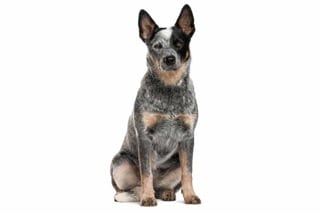
The Australian Cattle Dog is a muscular working dog native to Australia and recognized by the American Kennel Club since 1980. They were developed from a mix of Blue Heelers and Dingoes with the purpose of herding cattle along long distances, and are also known as Red and Blue Heelers. They have a sturdy and athletic body, with a broad slightly rounded skull, almond-shaped eyes, short-haired, water-resistant coat that may be blue or red or a combination of both. These dogs stand 18 to 20 inches high and weigh up to 50 pounds. Cattle Dogs have a coat that is strictly low-maintenance and sheds dirt easily. They have feathering on legs and tail, with pointed ears that stand erect and have a keen sense of hearing. The nose is black and the eyes can be brown, hazel, or blue in color. The main color of their coats can be red, blue, black or tan with white markings. The breeds used in the creation of these dogs included Dingoes, Collies, Bulldogs, and Dalmatians among others. Cattle Dogs are known for their hard working nature, loyalty, protectiveness, and intelligence. They are very active and need plenty of daily exercise, and they train easily and do best with a specific handler. Cattle Dogs are great family dogs aswell as devoted guardians making them a well rounded option as a companion to most households. What really makes them stand out from other breeds is their sensitive and dedicated nature when it comes to their herding duties.
The Australian Cattle Dog is an intelligent, active, and loving breed with a lot of energy and enthusiasm. They are beloved as family pets due to their loyal, devoted, and friendly personalities. They are observant, alert, and wary in nature, and can form strong bonds with their owners. This breed is patient and tolerant, and gets along well with children and other pets when properly socialized and trained. As a breed that loves to work and play, they require regular exercise and stimulation, and do best with daily walks, runs, playtime, or other activities that keep them active and engaged. Australian Cattle Dogs also thrive indoors, but can be noisy and vocal which should be taken into consideration when living in close quarters.
The Australian Cattle Dog is an intelligent and active breed that needs lots of physical activity and mental stimulation to stay healthy. They require a balance of proteins, fats, carbohydrates, vitamins, minerals and omega fatty acids in their diet. Feeding guidelines should include high quality kibble tailored to the dog’s age, size, and activity level. Responsible ownership means regularly checking with a veterinarian and adjusting their diet when necessary. A healthy diet is essential to a dog’s wellbeing and can help to prevent common health problems. Way Canina has helpful information on the Australian Cattle Dog and offers advice on finding a quality dog food for these dogs. Therefore, it’s important to research your dog’s breed and any potential nutritional needs. Being mindful of their diet, making sure they get enough physical and mental exercise and forming a bond with your canine companion are essential elements for providing an fulfilling and healthy life for the happy and energetic Australian Cattle Dog.
To maintain their ideal weight, make sure to feed them a balanced diet and provide them with plenty of regular exercise. Genetics can play an important role in their life expectancy, so it’s best to have them examined by a veterinary professional for any inherited health issues or predispositions and receive the best advice for their individual needs.
The Australian Cattle Dog is a loving and loyal dog breed with a medium-length lifespan between 12–15 years. To keep them healthy, it’s important to regularly take them to the vet for check-ups, vaccinations, and preventive care. Grooming needs can range from occasional brushing to more frequent bathing and ear cleaning.
Are you considering getting an Australian Cattle Dog, or do you already own one? If so, it is important to consider the responsibilities that come with owning this breed, as well as their pros and cons. Don’t forget to check out the blog posts and articles on Way Canina to compare different breeds and find additional information about their lifestyle and wellbeing.